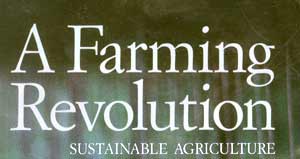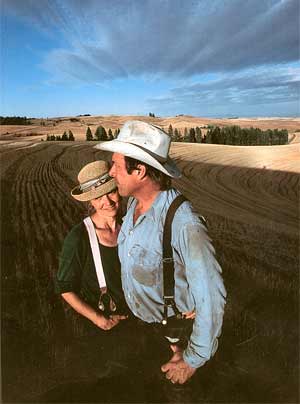 |


A Farming Revolution — Sustainable Agriculture ONE LAST STOP, on the eastern edge of the Palouse, one of this country’s most fertile agricultural regions, a rolling sweep of pea and wheat fields. This is a place where agriculture is still young, yet the crowns of many of its hills are nearly bare, the topsoil washed downhill. Just east of Moscow, Idaho, I visited Paradise Farm, run by Mary Jane Butters and her husband, Nick Ogle. He is a lifelong farmer in his mid-40s who grew up on the land he farms. She was raised in Utah and worked for many years as a wilderness ranger and fire tower lookout for the U.S. Forest Service before buying five acres at the base of Paradise Ridge. In 1986 Mary Jane Butters founded the Palouse Clearwater Environmental Institute, an organization committed to sustainable agriculture, environmental preservation, and consumer education. Mary Jane and Nick have been married for two years. He lives at his house, just a mile and a half down the road, with his children, and she lives at her house with her children. There is a family reunion almost every day. I came to visit in June. The roadsides were full of cow parsnips, or “floating doilies,” as they’re called on this farm. Mary Jane’s farmhouse is perched on a knoll, surrounded by perennials set in straw mulch, and it looks out over mature conifers on to the fields of the Palouse, which roll off to the horizon like heavy seas. Her mail-order company is called Paradise Farm Organics, Inc. - instant falafel, hummus, tabbouleh, and dried turtle beans, lentils, and split peas. She has recently introduced a line of organic backpacking foods called Backcountry Ecocuisine. The raw ingredients are grown by local farmers, and the foods are packaged by Moscow residents, some of whom make two and three times the local average hourly wage working for Paradise Farm Organics. “We had as many sales the first week of June as we had the whole month of May,” Mary Jane says. We are standing in what would be the living room of an ordinary house. But shelving runs around the walls of this room, and on a clean, wooden bench there is a food scale and a heat-sealer and a rack to hold open unfilled food packages. Barrels of bulk grain and spices line the floor. The scent of cumin hangs in the air. “Because we created a market,” says Mary Jane, “we made it possible for farmers to convert to organic production. It’s not like you’re dealing with politicians or beating your head against the wall. You just do it. I like the idea of creating social change through the business community.” Later that morning Nick and I drove down the road to get the mail and to look at two pea fields planted side by side, one grown conventionally, the other organically. I found it hard to tell them apart, if only because in the Palouse it is hard to keep your eyes from following the hills as they porpoise off into the distance. “What we’re trying to do here at Paradise Farm,” Nick said, “is to make it profitable to go out and try new things. The conventional farmer gets his price-support check, but I don’t view that as being a price support for the farmer. It’s for the consumer, keeping the price of food down so the consumer can have cheap food and more disposable income. That’ll catch up with us. The fact is we’re going to run out of oil. I don’t care if it’s 50, 100, 200 years, we will run out of oil. We will run out of coal, all the things that agriculture feeds on. We’re using resources at an alarming rate, and people don’t realize that there’s going to be an end to all this.”
It’s tempting to believe that sustainability is an issue that begins and ends on the farm. But that is netiher where it begins nor where it ends. Standing beside a pea field, listening to Nick, I was reminded that it is the consumer who should - but often does not - have the final voice in how farmers farm. In hundreds of locations a growing number of consumers are having their say: In downtown farmers’ markets from Manhattan to Hollywood, at roadside stands on rural routes in the Berkshires and the Great Smoky Mountains, through co-ops and consumer-owned farms scattered across the country, through mail-order outlets such as Paradise Farm. To be sure, the marketplace still lags behind the demand. The challenge of reestablishing a distribution system that once connected the consumer with small farmers remains a formidable one throughout much of the nation. Still, in the tone of Nick’s voice out by that pea field, I was reminded of something Fred Kirschenmann had said to me at the C & R Dairy Treat in Medina, North Dakota. He was telling me about an evening when he and a television interviewer visited a friend of his, a successful conventional farmer. “She asked him a whole bunch of questions about how he was running his farm,” Kirschenmann said. “And then as she was about ready to go, she said, ‘Tell me how you feel about the future.’ “It got real quiet, and he said, ‘Well, I’ll tell you. I’m just glad I’m as old as I am. There’s so many problems, I’m glad I won’t be around much longer.’” Fred pushed back his chair and laughed. “My feeling was, hell, I wish I was at least 40 years younger. There’s so many things I want to do.”
|
||||||||||||||||||


